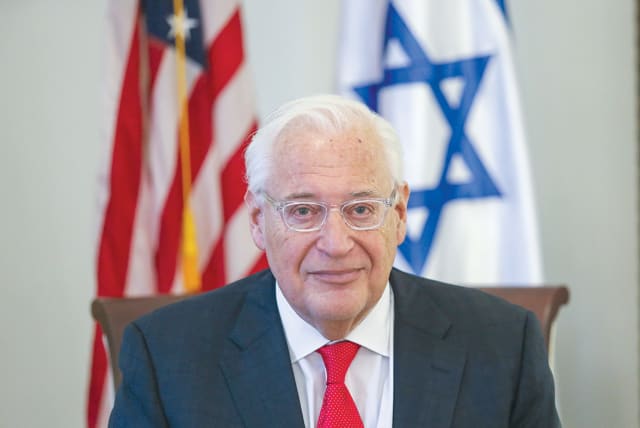What is David Friedman's plan for the Israeli-Palestinian conflict?

David Friedman’s vision is for a holistic solution to improve regional stability, enabling both Jews and Palestinians to continue living in Judea and Samaria (the West Bank).
As Israel’s war against Hamas raged on and the Democratic administration of US President Joe Biden stepped up pressure for a two-state solution to the Israeli-Palestinian conflict, David Friedman, who served as ambassador to Israel under the former Republican administration of Donald Trump, presented a new peace plan at the National Religious Broadcasters (NRB) convention in Nashville, Tennessee, on February 22.
“Give up all the fantasies,” Friedman declared, adding that after Hamas’s October 7 attack, “there can’t be a two-state solution.” According to Friedman, “A Palestinian state is an existential threat to the State of Israel. A two-state solution is a dead letter; Israel has no margin of error, and the Palestinian leadership has proven unreliable as a peace partner.”
The plan, titled The Future of Judea & Samaria, was drafted by the Friedman Center for Peace Through Strength, a nonprofit established by Friedman dedicated to “expanding the Abraham Accords and actualizing the vision of Isaiah that nation shall not lift up sword against nation nor study war anymore.” The plan’s implementation would be spearheaded by the US, Israel, and Abraham Accord states. Under the proposal, Israel would retain sovereignty in Judea, Samaria, and the Jordan Valley and maintain overriding security control, while Palestinians would have “maximum civil autonomy” in areas built up and largely funded by Gulf states.
The Future of Judea & Samaria
While Israelis were divided on a two-state solution before the war, Friedman said, they aren’t anymore. Just a day earlier, he pointed out, the Knesset voted 99-11 against a unilateral declaration of Palestinian statehood. Prime Minister Benjamin Netanyahu presented the resolution in the wake of reports that the Biden administration was preparing a detailed plan for a peace deal between Israel and the Palestinians that included a timeline for a Palestinian state. “The Knesset came together in an overwhelming majority against the attempt to impose on us the establishment of a Palestinian state, which would not only fail to bring peace but would endanger the State of Israel,” Netanyahu said.
Opposition leader Yair Lapid said that despite his support for the resolution, he did not believe the Americans were planning to unilaterally recognize a Palestinian state. “You invented a threat that doesn’t exist,” he told Netanyahu. The Palestinian Authority said in response that it “reaffirms that the State of Palestine’s full membership in the United Nations – and its recognition by other nations does not require permission from Netanyahu.”
According to a Gallup poll published on March 4, Americans’ opinions of both Israel and the PA have worsened in the past year. Some 58% of Americans have a “very” or “mostly favorable” view of Israel (down from 68% last year)– the lowest favorable rating for the Jewish state in more than two decades. At the same time, positive opinions of the PA have dropped from 26% to 18% – the lowest since 2015. “While Americans’ underlying pro-Israeli sympathies have not changed since the war began, they are now divided over which side the US should pressure more to end the conflict,” Gallup concluded, noting that a slim majority of Americans – 53% – continue to favor the establishment of an independent Palestinian state, while 34% are opposed.
Friedman’s vision is for a holistic solution to improve regional stability, enabling both Jews and Palestinians to continue living in Judea and Samaria (the West Bank), while guaranteeing that holy sites remain accessible to all.
The Jerusalem Report is publicizing the plan not because we endorse it but because it’s worthy of discussion. As Friedman put it, “Let’s not let the perfect get in the way of the possible.”
If you’d like to see Friedman presenting the controversial plan to the NRB so that you can make up your own mind, you can watch it here:
Jerusalem Post Store
`; document.getElementById("linkPremium").innerHTML = cont; var divWithLink = document.getElementById("premium-link"); if (divWithLink !== null && divWithLink !== 'undefined') { divWithLink.style.border = "solid 1px #cb0f3e"; divWithLink.style.textAlign = "center"; divWithLink.style.marginBottom = "15px"; divWithLink.style.marginTop = "15px"; divWithLink.style.width = "100%"; divWithLink.style.backgroundColor = "#122952"; divWithLink.style.color = "#ffffff"; divWithLink.style.lineHeight = "1.5"; } } (function (v, i) { });

